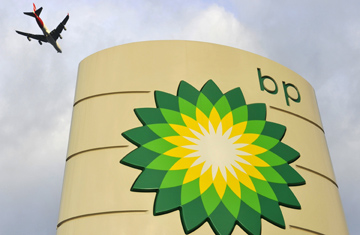
A BP fuel station in London on July 27, 2010
This time last year, as BP chief executive Tony Hayward was walking journalists through the oil giant's second-quarter results, he applauded the firm for steering "a steady course through choppy waters." Sluggish demand for its oil and gas hadn't stopped BP from turning a healthy profit. Production, meanwhile, was growing nicely. And all thanks, Hayward was keen to stress, to "safe and reliable operations."
But that was before the oil spill. As efforts continue to plug BP's leaking well in the Gulf of Mexico, the scope of the destruction wrought by the spreading oil is still unknown. The damage to the company's fortunes, however, is becoming clearer. The firm lost $17 billion in the quarter ending June 30, BP announced on Tuesday, the biggest such shortfall in British corporate history. The massive loss is due to the $32 billion provision the company said it had set aside to cover containment, cleaning, compensation and fines related to the spill. Hayward, as expected, paid his own price. BP confirmed reports that its much-criticized, gaffe-prone boss would step down in the fall. The firm would be "a changed company as a result" of the largest oil spill in U.S. history, Hayward said in a statement. "It is right that it should embark on its next phase under new leadership."
The scale of that change is not unremarkable; BP's earnings announcement almost doubled as a blueprint for a redesigned company. To help pay those bills related to the spill — including the $20 billion compensation fund agreed with the U.S. in June — the firm said it plans to sell off assets worth $30 billion over the next year and a half, three times the value it quoted just a few weeks ago. Gone already are assets in North America and Egypt, sold earlier this month to U.S. oil firm Apache for $7 billion; operations in Vietnam, Pakistan and Alaska could soon follow.
Flogging mature oil and gas fields would "leave the company with a smaller but higher-quality exploration and production business," BP said. But it won't make the company any easier to run. The task of mending damaged relationships with U.S. authorities, dealing with a slew of federal probes into the spill and — not least — securing future business in the U.S. passes to Robert Dudley, the 54-year-old head of BP's spill-response operation, who is scheduled to take over from Hayward in October. Born in New York and raised in Mississippi, the former Amoco executive will be BP's first American CEO.
In p.r. terms, the switch is no bad thing; Dudley's nationality might well lessen the emphasis some critics place on BP's "Britishness." What's more, the valuable experience Dudley picked up running TNK-BP, the British company's Russian joint venture, could stand him in good stead for the challenges ahead. (A squabble with Russian shareholders eventually forced him to step down as head of the unit in 2008.) That, alongside "significant experience in [exploration and production]," analysts at Morgan Stanley wrote in a note to clients on July 26, means "his CV ticks the right boxes."
But trying to predict Dudley's impact on BP amid investigations, legal proceedings and perhaps even shifts in U.S. energy policy amounts to trying to plug a leaking well in the midst of a tropical storm. BP has to first "convince the U.S. authorities, and indeed Congress, that they have what it takes to go through that rigorous process of checking and double-checking everything," says Howard Wheeldon, senior strategist at broker BGC Partners in London. "Once they've answered the critics and the various inquiries going on, only then can they begin to persuade the U.S. Administration that this is a company that should be allowed to invest [in new energy exploration or production]."
That doesn't mean doomsday for BP. Its shares have rebounded in the past few weeks from the 14-year low of $4.60 that they reached at the end of June. Strip out the cost of dealing with the Gulf spill, meanwhile, and BP's sprawling global operation made a $5 billion profit last quarter. But keeping momentum going has surely been made harder by the disaster. "We ... cannot help thinking that the exceptional spill-related calls on BP's cash over the next few years must have some impact on the pace at which the group takes development decisions," analysts at investment bank Barclays Capital wrote in a July 23 research note. Moreover, "one of the longer-term impacts of the spill could be to reduce BP's standing as a partner of choice," the analysts added, "potentially limiting its ability to strike such contracts with host governments." The spill could soon be over — the well is capped and a permanent plug is expected to be in place within a few weeks. But the challenges facing BP are just beginning.
